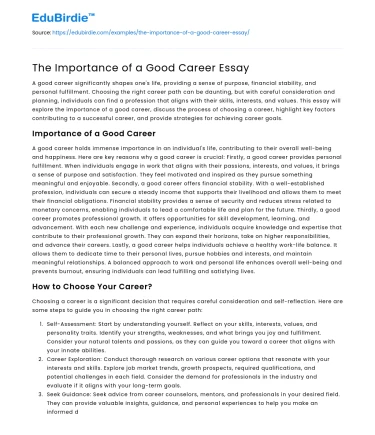A good career significantly shapes one's life, providing a sense of purpose, financial stability, and personal fulfillment. Choosing the right career path can be daunting, but with careful consideration and planning, individuals can find a profession that aligns with their skills, interests, and values. This essay will explore the importance of a good career, discuss the process of choosing a career, highlight key factors contributing to a successful career, and provide strategies for achieving career goals.
Importance of a Good Career
A good career holds immense importance in an individual's life, contributing to their overall well-being and happiness. Here are key reasons why a good career is crucial:
Save your time!
We can take care of your essay
- Proper editing and formatting
- Free revision, title page, and bibliography
- Flexible prices and money-back guarantee
Firstly, a good career provides personal fulfillment. When individuals engage in work that aligns with their passions, interests, and values, it brings a sense of purpose and satisfaction. They feel motivated and inspired as they pursue something meaningful and enjoyable.
Secondly, a good career offers financial stability. With a well-established profession, individuals can secure a steady income that supports their livelihood and allows them to meet their financial obligations. Financial stability provides a sense of security and reduces stress related to monetary concerns, enabling individuals to lead a comfortable life and plan for the future.
Thirdly, a good career promotes professional growth. It offers opportunities for skill development, learning, and advancement. With each new challenge and experience, individuals acquire knowledge and expertise that contribute to their professional growth. They can expand their horizons, take on higher responsibilities, and advance their careers.
Lastly, a good career helps individuals achieve a healthy work-life balance. It allows them to dedicate time to their personal lives, pursue hobbies and interests, and maintain meaningful relationships. A balanced approach to work and personal life enhances overall well-being and prevents burnout, ensuring individuals can lead fulfilling and satisfying lives.
How to Choose Your Career?
Choosing a career is a significant decision that requires careful consideration and self-reflection. Here are some steps to guide you in choosing the right career path:
- Self-Assessment: Start by understanding yourself. Reflect on your skills, interests, values, and personality traits. Identify your strengths, weaknesses, and what brings you joy and fulfillment. Consider your natural talents and passions, as they can guide you toward a career that aligns with your innate abilities.
- Career Exploration: Conduct thorough research on various career options that resonate with your interests and skills. Explore job market trends, growth prospects, required qualifications, and potential challenges in each field. Consider the demand for professionals in the industry and evaluate if it aligns with your long-term goals.
- Seek Guidance: Seek advice from career counselors, mentors, and professionals in your desired field. They can provide valuable insights, guidance, and personal experiences to help you make an informed decision. Engage in informational interviews to gain deeper insights into different career paths and learn from individuals with firsthand experience in those fields.
- Gain Experience: Gain practical experience in your chosen field through internships, part-time jobs, or volunteer work. This hands-on experience will help you better understand the industry, validate your field interest, and make informed decisions. Additionally, it provides opportunities to network with professionals and expand your professional connections.
- Consider Future Prospects: Evaluate the long-term prospects of your chosen career. Look for industries with growth potential, evolving technologies, and changing market demands. Consider how your chosen career path may evolve and whether it aligns with your long-term goals and aspirations.
What Helps in Making a Good Career?
Several factors contribute to building a successful and fulfilling career. Here are key elements that can help in making a good career:
- Hard Work and Dedication: Building a good career requires a strong work ethic, commitment, and perseverance. Putting in the effort and going the extra mile can set you apart from others in your field. Embrace challenges, take on new responsibilities, and demonstrate a willingness to improve and excel continuously.
- Continuous Learning: In today's rapidly evolving world, continuous learning is essential for a successful career. Stay updated with industry trends, advancements, and new technologies. Seek professional development opportunities, attend workshops, seminars, and acquire new skills to enhance your knowledge and remain competitive.
- Networking: Building a strong professional network can open doors to new opportunities and support your career growth. Attend industry events, join relevant organizations, and connect with professionals in your field.
- Effective Communication: Strong communication skills are crucial for professional success. Develop verbal and written communication skills to effectively convey ideas, collaborate with colleagues, and build positive relationships with clients and superiors. Clear and concise communication promotes understanding and fosters a productive work environment.
Integrating these factors into your career journey can build a solid foundation for success and create a fulfilling and rewarding professional path. Remember, building a good career is a continuous process that requires dedication, self-improvement, and a commitment to personal and professional growth.
How to Achieve Your Career Goal?
To achieve your career goals, set clear and specific objectives that align with your aspirations. Create a detailed plan outlining actionable steps and deadlines. Seek mentorship and guidance from experienced professionals who can provide insights and support. Continuously improve your skills through learning and professional development opportunities. Stay focused and dedicated, adapting to challenges and learning from failures. Regularly evaluate your progress and make adjustments as needed. Persistence, resilience, and a proactive approach will propel you toward achieving your career goals.
Conclusion
In conclusion, a good career is vital for personal fulfillment, financial stability, and professional growth. Individuals can embark on a fulfilling and prosperous professional journey by carefully choosing a career path, considering key factors contributing to success, and implementing strategies to achieve career goals.






 Stuck on your essay?
Stuck on your essay?

